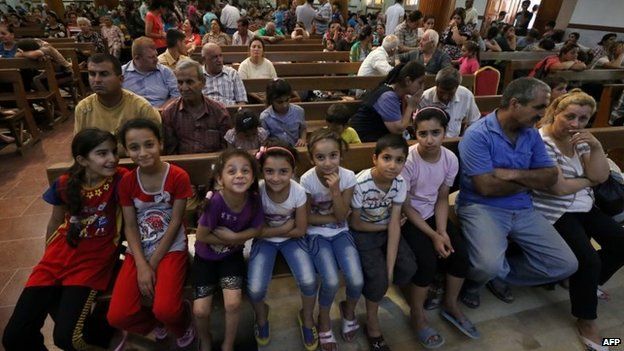Iraq Christians flee as Islamic State takes Qaraqosh
- Published

Up to a quarter of Iraq's Christians are reported to be fleeing after Islamic militants seized the minority group's biggest town.
The Islamic State (IS) group captured Qaraqosh overnight after the withdrawal of Kurdish forces.
IS has been gaining ground in northern Iraq since June, and also controls some of Syria.
The US has warned that the situation for Iraq's minority groups threatens to become a "humanitarian catastrophe".
``We are gravely concerned for their health and safety," said White House spokesman Josh Earnest.
But he refused to confirm a New York Times report that the US is considering air strikes to help the Yazidi community, another minority group in northern Iraq that has been targeted by IS.
About 50,000 Yazidis are thought to have been trapped in the mountains after fleeing the town of Sinjar - although the UN says some of them have now been rescued.
The United Nations Security Council is due to meet in emergency session later on Thursday to discuss the situation.
Tens of thousands of Iraqi Christians and Yazidis are understood to have fled their homes, as James Robbins reports
Tens of thousands of religious minorities have been forced to flee since IS, a Sunni Muslim group formerly known as Isis, launched its onslaught.
IS says it has created an Islamic state in the territory it controls.
In other developments:
- A suicide bombing in a Shia Muslim area of Baghdad killed at least 14 people
- IS said it had captured the strategic Mosul dam on the Tigris river - a claim denied by Kurdish forces who insist they are still in control
- At least six people died in a car bomb attack near a Shia mosque in the northern city of Kirkurk
Plea for help
A majority of Nineveh inhabitants left their homes overnight, according to Fraternite en Irak, an international Christian organisation based in Paris.
As many as 100,000 people are believed to be fleeing toward the autonomous Kurdistan Region.
Pope Francis has made an impassioned appeal to the international community to do much more to address the crisis.
A Vatican statement said the Pope had appealed for "all necessary help" to be given to those forced to flee their homes, "whose fate depends entirely on the solidarity of others".
And Minority Rights Group International has warned that Iraq's multi-ethnic future is now at grave risk.
Christian 'catastrophe'
Kurdish forces, known as the Peshmerga, have been fighting the IS militants' advance for weeks.
The Peshmerga's commander in Qaraqosh reportedly told the town's archbishop late on Wednesday that the forces were abandoning their posts.
Several senior clergymen in Nineveh confirmed the town had fallen.
"It's a catastrophe, a tragic situation: tens of thousands of terrified people are being displaced as we speak," said Joseph Thomas, the Chaldean archbishop of the northern city of Kirkuk.
Eyewitnesses in Qaraqosh said IS militants were taking down crosses in churches and burning religious manuscripts.
The town - referred to as Iraq's Christian capital - is located 30km (19 miles) south-east of the city of Mosul, which was captured by IS in June.
Last month, hundreds of Christian families fled Mosul after the Islamist rebels gave them an ultimatum to convert to Islam, pay a special tax or be executed.
Iraq is home to one of the world's most ancient Christian communities, but numbers have dwindled amid growing sectarian violence since the US-led invasion in 2003.
Iraq's minorities
Christians
- The majority are Chaldeans, part of the Catholic Church
- Numbers have fallen from around 1.5 million since the US-led invasion in 2003 to 350,000-450,000
- In Nineveh, they live mainly in towns such as Qaraqosh (also known as Baghdida), Bartella, Al-Hamdaniya and Tel Kef
Yazidis
- Secretive group whose origins and ethnicity are subject to continuing debate
- Religion incorporates elements of many faiths, including Zoroastrianism
- Many Muslims and other groups view Yazidis as devil worshippers
- There are estimated to be around 500,000 Yazidis worldwide, most living in Iraq's Nineveh plains
Plight of the Yazidis
Meanwhile, the UN said it was mobilising resources to assist Yazidis rescued from Mount Sinjar over the past 24 hours.
Members of the ancient Kurdish ethno-religious community sought refuge there at the weekend.
Almost 200,000 civilians have been displaced from Sinjar town, the UN Office for the Coordination of Humanitarian Affairs has warned.
Those trapped on the mountain are facing dehydration, and 40 children are reported to have died already.
"This is a tragedy of immense proportions, impacting the lives of hundreds of thousands of people," said UN spokesman David Swanson.
"Many of the displaced are in immediate need of essential life-saving humanitarian items, including water, food, shelter and medicine."
- Published7 August 2014
- Published21 July 2014